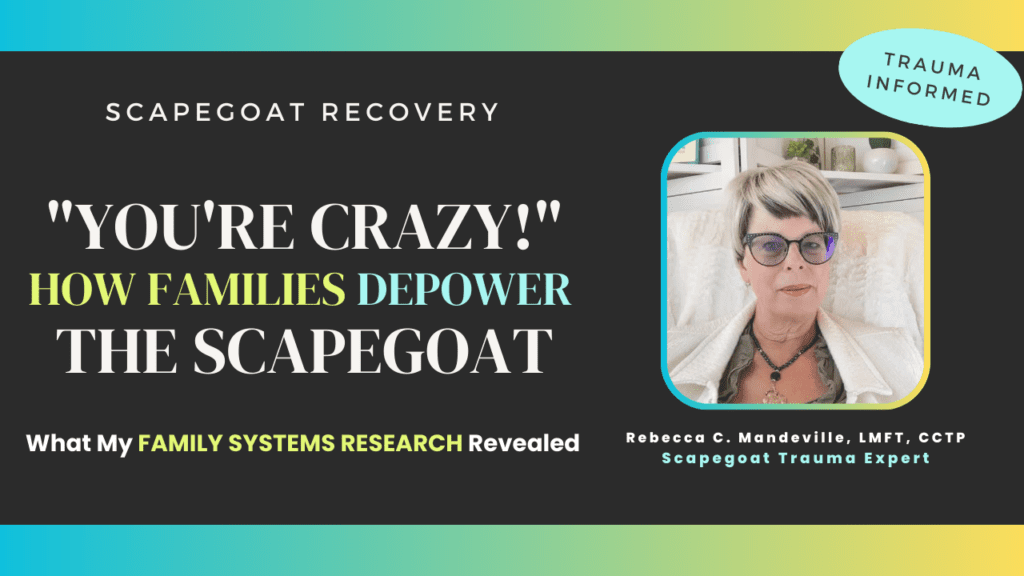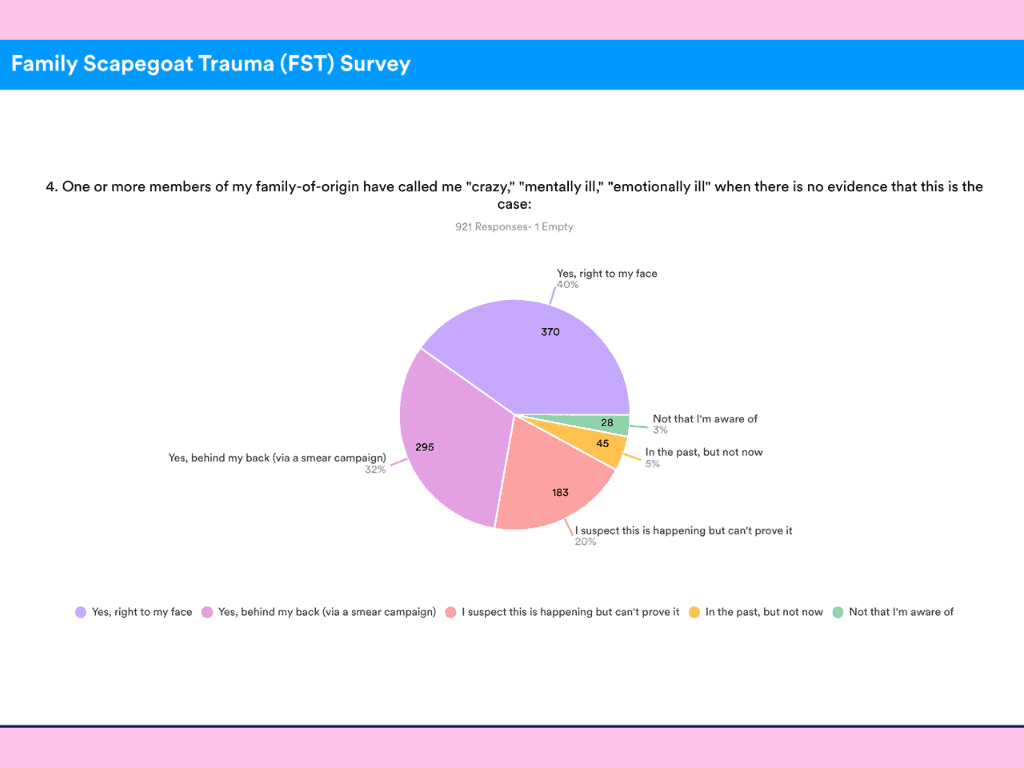Have you ever been called crazy or emotionally or mentally ill by members of your own family, either to your face or behind your back? If so, you’re not alone, as my latest research results on this particular aspect of family scapegoating abuse (FSA) attests.
If you prefer to listen to this discussion instead, you can check out my video here.

Those of you who have read my introductory guide on what I named family scapegoating abuse (FSA), Rejected, Shamed, and Blamed, may already be familiar with this issue of scapegoated children and adult children being told they’re “crazy” or mentally or emotionally ill because I do discuss this briefly in my book.
However, it was always my intention to conduct more research on this particular issue; I therefore included a question about this specific aspect of FSA in the survey that I just wrapped up (if you missed taking it that’s okay – I’ll be rolling out two more surveys before the year ends).
The research I conduct is qualitative in nature, meaning I’m looking at people’s lived experience. The pool of research respondents are people who identify as being in the ‘family scapegoat’ role, so that’s an important consideration to remember when you’re looking at my research results. I also like to point out that this is not peer-reviewed research.
Why Abusers Must Discredit Their Victims
Why would someone be told that they’re “crazy,” or mentally or emotionally ill, or “psycho” (or whatever words a family member chooses to use)? Why would they say this to, or about, someone in their family when it simply is not true?
There’s a lot of reasons that this can happen. In my clinical opinion (and experience), this is primarily done in an attempt to depower the target of FSA. This is also a way to do what I called in a recent video a preemptive strike – something I see most often with a covert narcissist parent or sibling who engages in scapegoating behaviors.
Specifically: If an abuser is ultimately successful in invalidating someone as a believable reporter to others or invalidating someone’s perceptions or their intelligence – their ability to see into the truth of things – then that’s going to possibly protect them from being called out on their abusive behavior.
In the end, calling the family ‘scapegoat’ “crazy” is a defensive maneuver whereby the abuser seeks to establish their sanity while simultaneously establishing the insanity (so to speak) of the person that they are abusing. After all, who would believe the reports of a crazy person?
“You’re Crazy!” and the False ‘Scapegoat Narrative’
To take it one step further: If the abusive family member is not challenged within the family (which is often the case if they are dominant and are able to intimidate or control weaker family members via angry, aggressive, or manipulative behavior), the idea that the scapegoated child or adult child is “crazy” or somehow mentally “off” or emotionally unstable will quickly be incorporated into the damaging scapegoat narrative that spreads throughout the entire family system like a toxic oil slick – a distorted narrative that gets repeated to people both in and outside the family; a false narrative that might follow the FSA target for life.
The dynamics described above are especially common in families where the scapegoated child is the victim of sexual abuse. There will typically be a strong campaign (courtesy of the abuser) to discredit that child in case they were to ever report the truth of what was actually happening to them at the hands of the abusive family member.
As a practicing clinician who works with FSA adult survivors, I will also see this “You’re crazy!” dynamic associated with the family Empath – the child or adult child who is able to intuitively see into, or through, dysfunctional family dynamics, although they are not always equipped to call abusive family members out on their behaviors due to protective survival responses.
Below is a slide from my final research results from Item #4 on my first survey of 2023. Percentages are based on a total of 922 survey respondents:

1 – 370 respondents – 40% – have been called mentally ill by a family member to their face.
2 – 295 respondents – 32% – have been called mentally ill by a family member behind their back.
3 – 183 respondents – 20% – suspect this is happening but can’t prove it.
The Scapegoat Narrative and Trauma
Just think about the above statistics for a minute. We’re living in a world where we have children growing up in families where they are invalidated, dismissed, and treated abominably at times, who are then labelled “crazy” by their family members – and there seems to be no meaningful socio-cultural conversations happening around this beyond ‘niche’ groups on social media.
The fact is, being told you’re crazy by your own family can be traumatizing. A child growing up hearing this message can be traumatized by it. An adult child getting this message can be traumatized by it. If it’s happened enough, they may feel hopeless and invalidated due to their truth being twisted, distorted, and/or denied and the fact of their abuse being ignored, disbelieved, and/or dismissed via one simple yet lethal phrase: “You’re crazy!”
Imagine how hard a child has to work to overcome this type of reality distortion. How can they feel confident going out into the world if from a very young age they may have been invalidated or told they’re mentally or emotionally ill? It may take the adult survivor of FSA years or decades to finally figure out that they grew up in a family that scapegoated them. They never really had a chance to feel safe and grounded and rooted in their truth, much less be supported, protected, and believed.
How many adult survivors experience suicidal ideation or have actually committed suicide because of these types of scapegoating behaviors that are happening every day all around us behind closed doors? I don’t know about you, but I’m not hearing enough people talk about this, including in the Mental Health profession.
If you were told you were crazy by members of your family, recognize it as a false narrative that has nothing to do with you. Be curious when you notice negative self-talk. Where did such negative statements and beliefs originate from?
How often are you dismissing and invalidating your own lived experience?
If you notice that you are on some level buying into these false beliefs, you may want to experiment with some of the affirmations I originally made for clients in my FSA Recovery Coaching practice which are now available for free on YouTube. I’ve had many people tell me they listen to them every day and they have found it to be very helpful in regard to subduing self-criticism, self-shaming, and self-blame. I hope this will be true for you as well.


Comments are public – Please do not leave sensitive or identifying information.